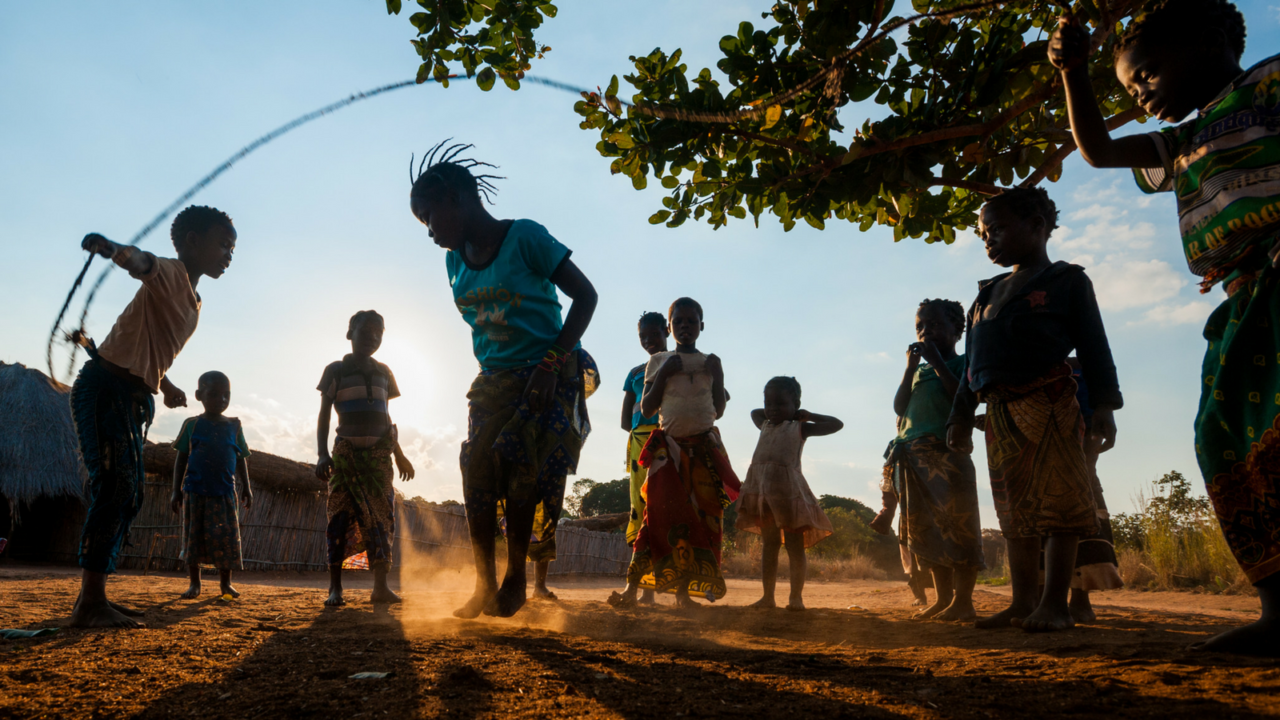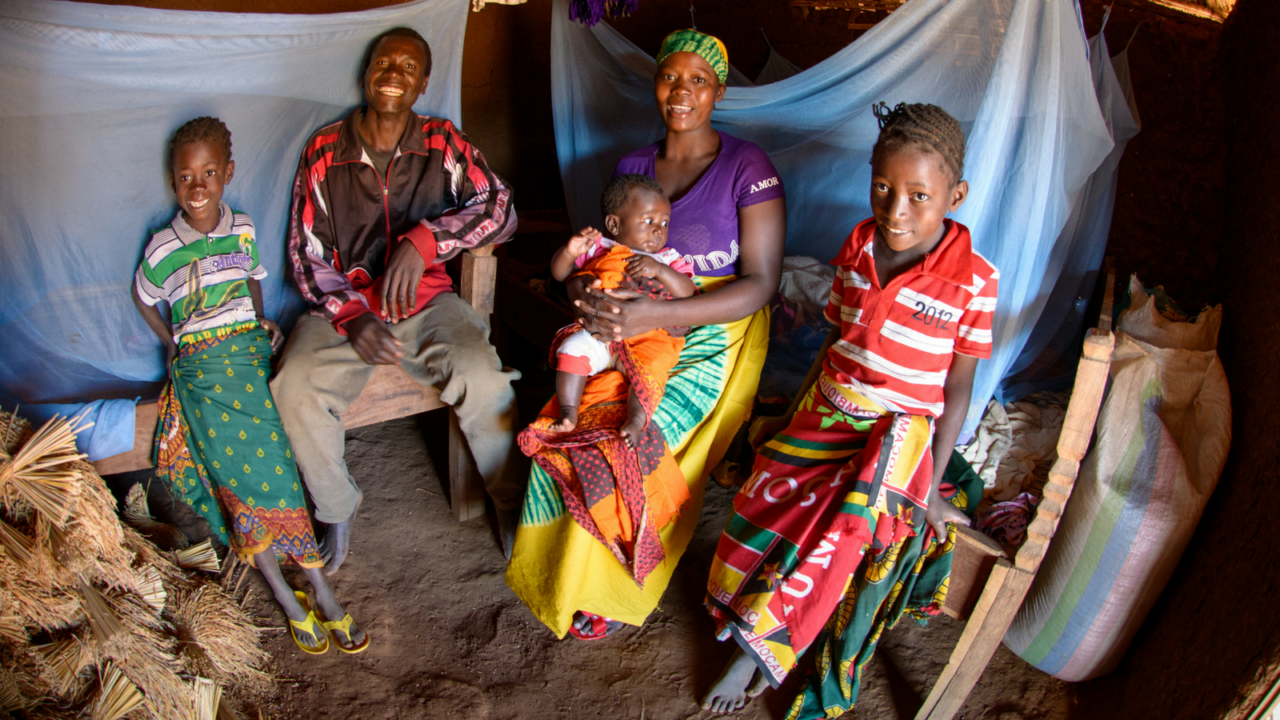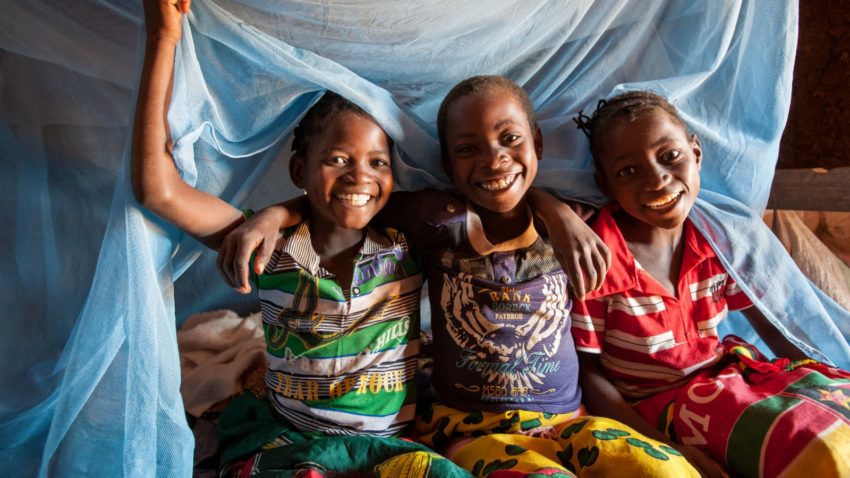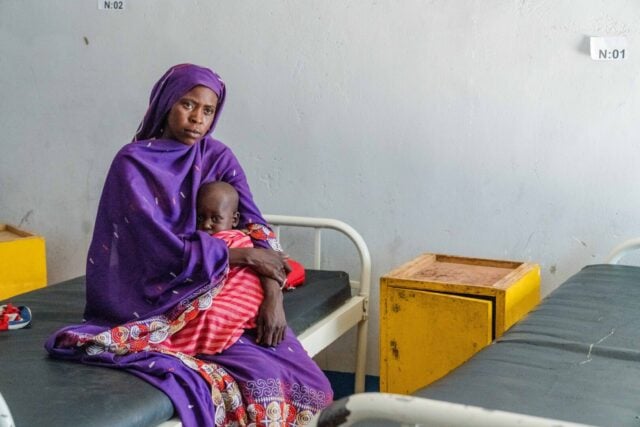Today is World Malaria Day! Join World Vision in remembering the lives devastated by this preventable, treatable disease — and in our mission of eradicating it from the world.
Step into the lives of three families who have seen malaria’s tragic effects firsthand. And then read a story that is more hopeful: highlighting the miraculous change a few square meters of netting has brought about for another Mozambican family.
* * *
Malaria strikes again
When neighbors learn that 16-month-old Zaita Antonia has died, life in the village grinds to a halt. Men come in from the fields. A rousing game of soccer is silenced. Women stop cooking and gather to comfort the baby’s mother, Rosa.
The noises of life are replaced by sounds of death: hushed voices, a woman’s uncontrollable sobs. Only the breeze that rustles the leaves of the cashew trees sounds the same.
Women gather inside Rosa’s house. A small coffin, freshly crafted, waits outside. In a forested glen about a mile from the house, the men have dug a grave for baby Zaita, shaded by tall trees against the warm winter sun.
Inside the hut, Rosa weeps, especially when the coffin is carried inside. She must relinquish all of baby Zaita’s belongings: her tiny clothes, her shoes, the brightly colored cloth that Rosa would have used to cocoon Zaita and keep her close. Rosa’s husband is visiting a sick relative and is still making the journey back. In a place with little money and few cars, transportation takes time.
The villagers walk quietly through the tall elephant grass to the cemetery, past empty fields and small gardens of sorghum, maize, and peanuts. One man leads the procession, holding high a roughly-hewn wooden cross. Two other men follow, carrying the casket.
The men stand along the graveside while the women sit. Everyone is silent, including Rosa. In Mozambican tradition, there is no crying at a funeral. Crying will disturb the person who has died.
All of Zaita’s possessions are buried with her body. The men cut pieces of wood, laying them over the coffin to protect it from the soil. They use what tools they have — shovels and a metal bowl — to fill the hole. The women sweep the graveside clean with tree branches, and then the cross is placed at the top of the mound. The men say a few words about baby Zaita — who she was, and who she might have been.
With that, the service is over. In sorrow, the villagers glide home through the tall elephant grass. Rosa goes back to her hut. Inside, she can cry again.
Edu fights for life
Some 32 kilometers away, a father is hoping and praying that his son will survive the terrible disease. Boniface Toneca, 23, has done everything in his power to keep his 3-year-old son, Edu, alive.
Edu became sick about a month ago. “I went to the clinic [nearly 50 miles away],” Boniface says. “The nurse tried everything.”
With baby Edu not getting any better, Boniface panicked. He helped his pregnant wife, Hortencia, and the baby onto the back of his bicycle and began to ride.
When he arrived at the hospital, the unexpected happened. Hortencia delivered. She is now staying in the maternity ward with the new baby, while Boniface is in the ward for the sickest of children.
Boniface has not seen his new baby, who has no name. His concern must be first for his sick child. And he is concerned about his livelihood. “I am a farmer, but I can’t do any farming,” he says. His sorghum is ready to harvest.
“With no one home, people could steal my harvest,” he adds, holding Edu closer. “I just want my child to get better.”
Boniface epitomizes what malaria does to families in Mozambique. This harvest is his investment — his savings plan for next year. But because of malaria, he cannot farm.
“How can you expect me to progress with a life like this?” he asks. “I have to watch over my child. It is really hard for me to see my child like this. And there is nothing I can give him.”
The family has no mosquito nets for protection. “In our village, the mosquitoes are so bad we can’t get away from them.”
It has been a tough night. Baby Edu is still not eating. At 3 years old, he weighs less than 18 pounds. “The situation is not good,” says the nurse.
When Boniface returns to the hospital, Edu has begun to feel better. Boniface leaves a few days later, biking the nearly 50 miles back home to try and salvage his sorghum harvest, to finally name his new baby, and to hope that Edu somehow survives his childhood.
A father’s misfortune
It appears that Elsa Chibante also has malaria complications. Her mother, Zaida, 23, holds Elsa in her lap at the Muera Health Clinic. Elsa, 5, is weak and feverish. Her symptoms will not go away.
Clinic nurse Armando Benjamin Baura says he saw 10 cases of malaria yesterday, seven of which were children. “Most of the cases I tend here are malaria — 70%,” he says.
Elsa’s father, Matthew, 29, has accompanied his wife and daughter to the clinic. “Today I would go to the field, but my child is still so sick I cannot go,” he says.
Matthew is worried about Elsa. “She’s coughing. She doesn’t eat well. Her breathing is hard. Her body is swelling. It’s been two weeks now,” he says.
His concerns are well grounded. His firstborn son, João, died of malaria. He was only 4 months old.
They lost Manuel next. He would be 7 if he had lived — but malaria took him three years ago.
“It was sad,” says Matthew. “He was a lively little boy. He loved to play. But the sickness got him in two days. He passed away at our house.”
Now, Manuel’s body is buried in the family’s cemetery. “We go to visit almost every week,” Matthew says. The cross at the grave is all they have to remember him by. “There are no photos of him,” Matthew says. “Only in my mind.”
He turns his attention back to Elsa. Matthew wants his little girl to recover and contribute to the family and to this community. “With God’s help, I would like so much for her to go to school. I never got to go to school,” he says. “Maybe this little girl will be my eyes and my ears.”
If she can recover.
A different story
Mosquitoes, death, and sickness could not be farther from Delfina Candido’s mind. There is too much for the third-grader to do today with exams at school and then washing her clothes for choir practice in the afternoon.
The 8-year-old in Nampula province, Mozambique, is sitting on her bed with her two best friends, Angelina and Boassane. All three girls swing their feet in rhythm. They sit under a canopy of mosquito netting, which World Vision provided last year.
“After church,” Delfina says, “we will play all day long until we come back home.” She and her friends are avid jump-ropers. Perhaps Angelina and Boassane will stay over; all three girls can fit under the mosquito net.

Outside, Delfina’s father, Eduardo, 35, thumbs through his daughter’s Portuguese workbook, mouthing the words out loud. Eduardo grew up during the civil war in Mozambique and missed out on a proper education.
Twenty years ago, Eduardo helped build the road in this community. It was World Vision’s first project in the area. As the country struggled to recover from civil war, there was little to build upon. World Vision gave men like Eduardo cash to work on roads and distributed seeds and tools so they could begin farming again.
Today, Eduardo’s home answers a question: Why?
Why have community members, relief staff, and donors worked so hard and given so much to support Mozambique? Eduardo’s house is proof. It is immaculate. The yard is swept baseball-diamond clean, the brush strokes still visible. A tall fence encloses two houses and a covered area for relaxing and gathering around a table. Eduardo recently built the second house, which better accommodates his family of five.
“Since we got the nets, we no longer get malaria,” he says. “Before, it was constant. It moved from one person to another. It never stopped.”
But when World Vision provided mosquito nets and training on how to use them, Eduardo’s family stopped getting sick. With no limits on his capacity to farm, his profits from rice, cassava, and peanuts skyrocketed.
“After the nets, we increased our yields,” he says. Before the nets, he could sell 10 bags of peanuts at US$50 per bag. After the nets were installed, his yield increased to 15 bags of peanuts. In peanuts alone, Eduardo earned an extra US$250 last year.
“Then we built a house,” he says. The new house is big enough for two beds. Each bed is covered by a net.
Eduardo’s girls don’t get sick anymore. Delfina is doing beautifully at nearby Naterre Primary School.
“She rarely misses school,” says her headmaster, Alfredo Francisco. “Delfina has very good grades.” In fact, grades have gone up for everyone since the nets were distributed. “Children are not missing classes,” he says. The teachers no longer contract malaria, either. Before, if a teacher became sick, the class was dismissed.
“When children get malaria,” he says, “they are sent home with an older student to take care of them. So it affects two students.” Last year, there were four or five cases of malaria among his students every day.
A nurse at the nearby health clinic says that they used to admit 50 malaria cases a month at the hospital. But, he says, between January and June 2012, the number dropped dramatically, to 50 cases over the entire six-month period.
As the sun begins to weaken in the winter sky, Delfina’s mother, Aida, arrives home, carrying baby Graciosa. Aida, 25, is taking a three-day course in health and nutrition to learn to better care for herself and her family.
“Now, I have time for other activities,” she says. “I can do more things. I am not worried about the children home with malaria.”
Aida’s daughters are also now healthy. “They play. They go to school,” Aida says. “That makes me happy.”

And her life is richer as well. “I have opened another farm. I am producing more peas,” she says.
“Before, our prayers were to God to protect our family,” Aida says. “Now, we thank God for everything that he has done.”
She’s delighted to live in a place where her children can be sponsored. “I am grateful for World Vision. I never knew there was such a thing as a net that would protect me from mosquitoes,” she says.
“Before, we were scared of mosquitoes,” Aida says. “The darker it got, the noisier it got and the more they stung.” But now Aida simply ignores the buzz, confident that the family’s insecticide-treated nets are killing or repelling mosquitoes.
Families can flourish when they’re not dominated by fear and disease. That’s why World Vision is dedicated to defeating malaria.
The strategy for victory involves canvassing the country with 2 million mosquito nets. “We train volunteers,” says World Vision’s Chandana Mendis. “We are responsible for community messages — radio spots, theatrics, focus groups.”
Anything to get the word out that mosquito nets, when used properly, can save lives.
It’s a strategy that’s already working in Nampula province, where mosquito-free nights are leading to industrious days for parents like Manuel and Aida. All that separates the rest of Mozambique from this dream is a handful of gossamer threads treated with insecticide — a mosquito net to take the fear out of life and rob death of its sting.
Lucia Rodrigues, Antonio Matimbe, and Marcos Marqueza contributed to this article.
This World Malaria Day, join with World Vision in our effort to stop this fully preventable disease.
Make a one-time donation to provide bed nets for families at risk because of malaria. These inexpensive, long-lasting nets repel disease-carrying mosquitoes when children are most vulnerable: in their sleep. You could even donate to provide nets for an entire village!
Also, consider sponsoring a child in Mozambique. For about $1 a day, your monthly gift will help provide children like Elsa with access to life-saving basics like education, medical care, clean water, nutritious food, and more!




Comments